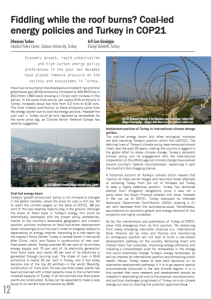Our article has been published at the Outreach Magazine* during COP21 Paris. We argued that Turkey needs to take bold decisions on its alternative development pathways if it is to go beyond special circumstances discourse in the new climate regime.
(*Outreach is a multi-stakeholder publication on climate change and sustainable development produced by Stakeholder Forum for a Sustainable Future and has been produced at various international meetings on the environment.)
Fiddling while the roof burns? Coal‐led energy policies and Turkey in COP21
Dr. Ethemcan Turhan, Istanbul Policy Center, Sabancı University, Turkey
Arif Cem Gündoğan, Ekoloji Kolektifi, Turkey
Turkey needs to take bold decisions on its alternative development pathways if it is to go beyond special circumstances discourse in the new climate regime.
Economic growth, rapid urbanisation and highcarbon energy policy preferences in the past two decades have placed immense pressure on the society and ecosystems in Turkey. Fossil fuel consumption has displayed a consistent rise and total greenhouse gas (GHG) emissions increased to 440 MtCO2eq in 2013 from 1990 levels showing a 110 per cent increase in this period. In the same time period, per capita GHG emissions in Turkey increased about two fold from 3.2 tons to 6.04 tons. The most notable contribution to these emissions came from the energy sector due to coalled energy policies. However the coal rush in Turkey could be fully replaced by renewables for the same price tag, as Climate Action Network Europe has recently suggested.
Coalled energy boom
Turkey’s ‘growthatanycost’ policy is not immune to changes in the global markets, where the price for coal is still low. Yet to reach the climate targets on the table at COP21, 88 per cent of the coal reserves need to stay in the ground. Although the share of fossil fuels in Turkey’s energy mix could be dramatically decreased with the proper policy preferences, thanks to the country’s favourable geographic and climatic position, political insistence on fossilfueldriven development leads increasingly to turn to coal in order to allegedly reduce its dependency on energy imports. According to a new report by the Istanbul Policy Center, Turkey is ranked fourth in the world after China, India, and Russia in construction of new coalfired power plants. Turkey provides 90 per cent of its primary energy supply and 70 per cent of its electricity generation from fossil fuels, and nearly 30 per cent of its electricity is generated through burning coal. The share of coal in GHG emissions is nearly 33 per cent in Turkey, and it has today become one of the top 20 emitters in the world. Recently, construction of more than 70 new coalfired power plants has been announced with a total capacity close to the current total installed capacity of Turkey. If all the planned coalfired power plants are constructed, Turkey can be expected to make a leap equal to its current total emissions by 2030.
Ambivalent position of Turkey in international climate change politics
The coalled energy boom and other ecological menaces are also haunting Turkey’s position within the UNFCCC. The defining lines of Turkey’s climate policy have remained almost intact over the past 20 years, making the country a laggard in the global effort to abate climate change. Turkey’s domestic climate policy and its engagement with the international cooperation on the efforts against climate change have evolved around country’s ‘special circumstances’, explaining in part the country’s footdragging stance.
A historical account of Turkey’s climate action reveals that inaction at these earlier stages and recurrent failed attempts at removing Turkey from the list of Annexes led Turkey to take a highly defensive position. Turkey has remained exempt from mitigation obligations since it was not a party when the Kyoto Protocol entered into force. However in the run up to COP21, Turkey disclosed its Intended Nationally Determined Contribution (INDC) showing a 21 per cent decrease from the businessasusual. Nonetheless, assumptions on economic growth and energy demand of this projection are highly contested.
So far, the interventions and submission of Turkey at COP21 show little divergence from its firm position. Yet abstaining from newly emerging interstate alliances (i.e. International Solar Alliance led by India and France) and maintaining an ambiguous position will not help to build a lowcarbon development pathway for the country. Removing direct and indirect fossil fuel subsidies, improving energy efficiency and initiating a concentrated push for renewables in the energy mix could drastically change Turkey’s energy landscape, as well as improve its international position and enhancing public health. Hence, Turkey needs to take bold decisions on its alternative development pathways if it is to go beyond special circumstances discourse in the new climate regime. It is in this context that more research and development should be invested in responding not only to the physical, socioeconomic, and political challenges lying ahead of Turkey visàvis climate change but also to charting the potential opportunities.


